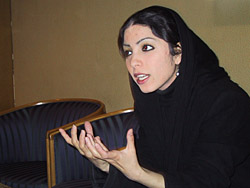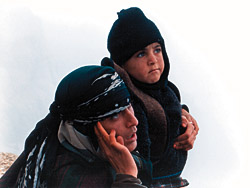|
Blackboards(Opening Film) Samira Makhmalbaf Director, December 16th. at Ginza Daiichi Hotel |
|
 --Blackboards, which made Samira Makhmalbaf the youngest recipient of the jury prize at the Cannes Film Festival, has the power to shake the audience from the bottom of their soul. Teachers travel with blackboards on their back, seeking students. Children try to learn to read while risking their lives smuggling goods. Old people and women with kettles tread mountain paths as they head toward their homeland, scorched by the fires of war. Delicately reacting to reality, they eventually go beyond time and space and obtain myth-like depth, strength, and expansiveness. Watching How Samira Made the Blackboard, you learn that Makhmalbaf has a clear image of all the scenes and tries out all the acting on her own. Her attitude of willingly acting out difficult scenes like wading into the cold water is powerful.
--Blackboards, which made Samira Makhmalbaf the youngest recipient of the jury prize at the Cannes Film Festival, has the power to shake the audience from the bottom of their soul. Teachers travel with blackboards on their back, seeking students. Children try to learn to read while risking their lives smuggling goods. Old people and women with kettles tread mountain paths as they head toward their homeland, scorched by the fires of war. Delicately reacting to reality, they eventually go beyond time and space and obtain myth-like depth, strength, and expansiveness. Watching How Samira Made the Blackboard, you learn that Makhmalbaf has a clear image of all the scenes and tries out all the acting on her own. Her attitude of willingly acting out difficult scenes like wading into the cold water is powerful." Things planned beforehand sometimes change during the filming because people who appear in this film are amateurs. However, through sharing life with them I can understand what kind of people they are. So for a part that falls in love I chose someone who can easily fall in love. In that way, the lines I give to them come out as their own lines. For example, in the beginning the teachers who travel with the kids were supposed to be the leading roles. Then I saw the part of a teacher who travels with the aged in one of the on-location assistants, and his personality worked into the film. I try to have myself as soft and open as possible while working." " The woman with whom that teacher falls in love has gone a bit crazy because of the war, so she cannot respond to whatever he asks her and appears to not even have a will of her own, then at one scene she powerfully moves the audience's heart."
There are a lot of symbolic scenes in the film. For example, there's only one woman in the group of old people. The reason behind this is given in How Samira Made the Blackboard. Samira has thought things out and her own set method of doing things in the other scenes too. " " The scene with the letter that no one can read came from meeting old people in the mountains, each of whom were sowing seeds by themselves. The teacher supposedly has knowledge, but that doesn't help at all when it comes to reading the letter. He has to use his imagination and come up with something that will meet the old people's expectations. The old man who can't urinate suddenly can't do something that's supposed to come naturally. This becomes a problem for the whole group, and even the grandchildren hear about it through the daughter. But problems like that disappear when life itself is at stake. And then the teacher and the widow have completely different ways of living and come from different cultures, so they can't live together, but then when their lives are in danger, they hide under the blackboard together. When it's a question of life or death, people will grab at any straw, and they come together when they share the same pain. I wanted to express these things through the small things in life, not paint them with a large brush." There are more than ten women directors active in Iran (which makes this more than in Japan?), but even so, one of the original actors, who was a professional, complained about Samira's direction and quitting the production. Nonetheless, Samira is positive about the situation. " Women directors run into problems and find their own ways around them. There are a lot of difficulties, but no one's about to quit because of them. The only really hard part is the first two days of a shoot. That's the deciding point whether or not the actors will accept my direction or whether they' ll quit. If I can gain confidence during the second day and get everyone to follow my lead, there aren't any problems after that." Å@ Ikuko Ishihara, Film Writer, The Seduction of Antonioni
Director's Profile: Born in Tehran in 1980. Eldest daughter of lran's doyen of cinema, Mohsen Makhmalbaf. At age eight, appeared in her father's The Cyclist. From 1994 to 1997, studied at the private film school Madresse Film. During that time. directed the fictional short Desert and the short documentary Painting Schools. After working as assistant director on Mohsen's The Silence (1998),made her first full-length film The Apple, an official selection of the ''Un Certain Regard"section of the Cannes Film Festival. |
